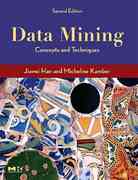An e-commerce company carries 1000 products, (P_{1}, ldots, P_{1000}). Consider customers Ada, Bob, and Cathy such that
Question:
An e-commerce company carries 1000 products, \(P_{1}, \ldots, P_{1000}\). Consider customers Ada, Bob, and Cathy such that Ada and Bob purchase three products in common, \(P_{1}, P_{2}\), and \(P_{3}\). For the other 997 products, Ada and Bob independently purchase seven of them randomly. Cathy purchases 10 products, randomly selected from the 1000 products. In Euclidean distance, what is the probability that \(\operatorname{dist}\) (Ada, Bob) \(>\operatorname{dist}\) (Ada, Cathy)? What if Jaccard similarity is used? What can you learn from this example?
Fantastic news! We've Found the answer you've been seeking!
Step by Step Answer:
Related Book For 

Data Mining Concepts And Techniques
ISBN: 9780128117613
4th Edition
Authors: Jiawei Han, Jian Pei, Hanghang Tong
Question Posted:





